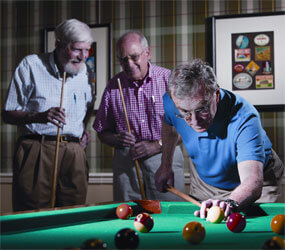The Merriam-Webster Dictionary lists one of the definitions for “resort” as “a place providing recreation and entertainment especially to vacationers.”
The dictionary might also want to consider this same definition, at least in part, for “retirement community.”
“It’s kind of like an all-inclusive vacation,” said Becki Bees, marketing manager for Roland Park Place, who explained Roland Park offers four to five different dining venues, housekeeping and laundry service, among other amenities.
Brad Andrus, director of marketing and resident life at Broadmead, a continuing care retirement community in Hunt Valley, echoed Bees’s claim. “(In a retirement community), you can do the things you want to do versus the things you have to do at home,” Andrus said. “Home ownership is work.”
These communities and many others are making retirement living far less daunting and far more fulfilling for older individuals stepping away from the working world, who perhaps are not ready for full repose but want the security of knowing the care is there for them when they need it.
Phil Golden, principal and executive director of Springwell Senior Living in Mount Washington, said Springwell is like “a hotel with health care.”
“It’s the whole of the community kind of pieced together that makes Springwell an attractive place for (retirees),” Golden said, adding that the community “supports the elder wherever they are in life.”
The director spoke of six pillars of successful aging, four of which, he said, are exercise, nutrition, healthy social interaction and wellness.
Springwell, for instance, caters to retirees’ nutrition with an executive chef and what Golden called “a great dining room” in the Sherwood Dining Room, as well as an alternative dining room, the open-air Terrace Grille offering outdoor seating.
He said a full-time activities director and staff program events that bring entertainers to the community, as well as indoor and outdoor activities that take advantage of the 15-acre campus.
“We’re in a location to allow residents to interact with the community at large in activities such as going out to plays,” Golden added.
Bees highlighted this increased ability to interact with others as a healthy characteristic of retirement communities. “The primary advantage is the social aspect: the opportunities for engagement, being able to make new friends, getting involved, learning new things,” she said. “It’s an opportunity to grow.”
To that end, retirement communities offer a variety of amenities from pools and fitness centers to classes and trips.
“All things are easily accessible in these communities,” Andrus said. “We have concerts, classes, and lots of opportunities here at Broadmead and a transportation system to take residents wherever they want to go.”
Edenwald in Towson offers its own array, said director of sales Diane Stinchcomb: indoor swimming, a full wellness center, and an indoor walking track, as well as Tai Chi, yoga and aerobics classes.
As if all that were not enough, Edenwald residents “play Mercy Ridge (a retirement community in Lutherville-Timonium) in water volleyball once every few months.”
“It’s quite the rivalry,” Stinchcomb said. “A lot of people here have friends there.”
The director explained Edenwald’s wellness coordinator recently worked with Mercy Ridge and Roland Park Place to organize a trail walk in which residents from all three communities participated.
While residents of these communities are finding opportunities to be both active and interactive, Bees said individuals who stay in their own homes can tend “to become stuck there.”
In terms of deciding to make the move into a retirement community, Golden said the question to ask is, “How does my single family home or townhouse stack up to those pillars of successful aging?”
He explained if exercise means moving from the armchair to the television, if meals for a retiree living alone involve only ingredients like peanut butter and jelly, and if social interaction has come down to children not calling enough and friends who have passed on, it might be time to think about making the move.
Likewise, for retirees who do not have the mobility to get themselves to church or Bible study anymore, Golden said Springwell offers six multi-faith services a week.
Andrus said this is “a new chapter in (retirees’) lives – they can meet new people, create artwork for the first time, volunteer.”
“What all these things really build is the opportunity to be engaged,” Bees explained. “There’s a definite advantage from a health standpoint of having everything in one place, particularly in a continuing care community – everything is there.”
“If a resident’s health changes,” she said, “his or herlifestyle doesn’t have to change,” and even if they’re at the health care center, they could still have dinner at the café with friends.
“It’s easier to maintain connections,” said Bees.


